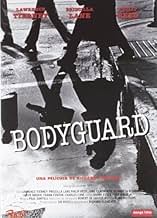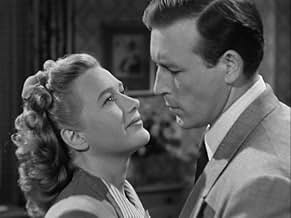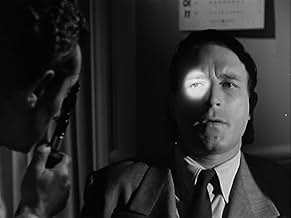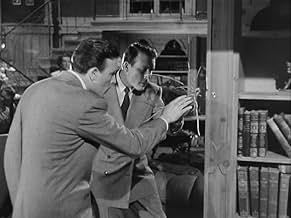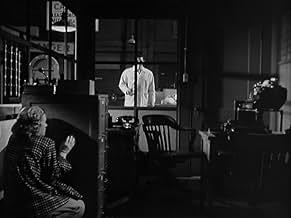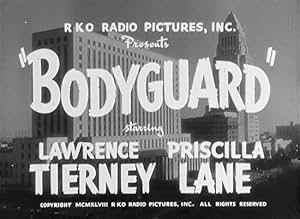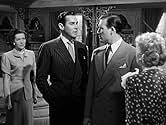IMDb RATING
6.5/10
1.3K
YOUR RATING
After being fired for insubordination, homicide detective Mike Carter is hired as bodyguard by the owner of a local meat-packing plant where a meat inspector has been murdered.After being fired for insubordination, homicide detective Mike Carter is hired as bodyguard by the owner of a local meat-packing plant where a meat inspector has been murdered.After being fired for insubordination, homicide detective Mike Carter is hired as bodyguard by the owner of a local meat-packing plant where a meat inspector has been murdered.
Erville Alderson
- Adam Stone
- (uncredited)
Bobby Barber
- Little Man in Street
- (uncredited)
Charles Bedell
- Cop
- (uncredited)
Claire Carleton
- Zinnia
- (uncredited)
Russ Clark
- Cop
- (uncredited)
Marcelle Corday
- Madalena
- (uncredited)
David Cota
- Pachuco
- (uncredited)
Joe Devlin
- Detective Sgt. Burch
- (uncredited)
Dante DiPaolo
- Young Man in Police Station
- (uncredited)
Featured reviews
Slick,speedy 'B' thriller with on(and off!)screen tough guy Lawrence Tierney as a suspended cop eventually agreeing to do some work on the side as a bodyguard for a wealthy family.The plot is inevitably fairly routine,but there are some well-handled scenes,and it remains watchable.One fact not usually mentioned;this was the final screen appearance of Priscilla Lane(best known for her roles in WARNER BROS. classics in the 30's,and Hitchcock's SABOTEUR);she was still far too young and surely had more years ahead as a screen actress.Her performance in her screen bow is OK,like Tierney and the rest of the cast.Director Richard Flesicher had better 'B' efforts up his sleeve though(THE NARROW MARGIN),a few years later.
BODYGUARD (1948) is a snappy 62-min. b&w noir programmer directed by Richard Fleischer and starring Lawrence Tierney. Rather than repeat what others have said here, I'd rather emphasize a couple of things that truly distinguish this film. For one thing, it was filmed largely on location at sites all over Los Angeles. Ex-policeman Mike Carter (Lawrence Tierney), trying to clear himself of a false murder charge, moves around L.A. quite vigorously in the course of his investigation, sometimes by car, sometimes by cab, and sometimes on foot, traveling to shops, offices, back alleys, factories, piers, and amusement arcades all over the city. If you like seeing film footage of L.A. in the 1940s, there are many films with abundant footage, but none quite like this one.
Also, I'd like to single out a very clever scene that offers an ingenious method of secretly transmitting key information from one location to another in the era before fax machines, cell phones, or e-mail. Carter needs the contents of a case file kept by the police officer whose murder he's been framed for. Only his girlfriend, Doris (Priscilla Lane), who works in the department, can find the file for him. He tells her over the phone to write down all the important cases handled by the officer in the past year and then go to an amusement arcade on 3rd Street, find a "Record Your Own Voice" booth and read all the cases into the microphone onto as many vinyl records (78 rpm) as needed, and then to leave the stack of records for him at the cashier's counter under an assumed name. Carter's plan is to go to the arcade, give the assumed name, enter an available booth and listen to the records until he finds the case he's looking for. There are wonderful little details of character and street life woven into the scene (and just about every scene in the movie). When Carter first enters the arcade, the brassy blonde at the counter is flirting with two sailors and claims not to know anything about a stack of records for a "Mr. Nolan." An anxious Carter gets insistent and the two sailors turn on him, spoiling for a fight. Only then does the manager come over and defuse the situation and find the package of records for Carter. It's just a brief moment but it not only adds to the suspense, but captures so much of the tenor of the time and place.
The basic plot itself-corrupt industrialist covers up shady business practices via murder and convenient frame-ups-would get recycled ad infinitum on TV cop shows in the 1970s. But it might have seemed somewhat fresh back in 1948, especially after ALL MY SONS (also 1948), based on Arthur Miller's play, raised a similar issue in a drama of a wartime industrialist who sends out defective airplane parts with tragic results.
Also, I'd like to single out a very clever scene that offers an ingenious method of secretly transmitting key information from one location to another in the era before fax machines, cell phones, or e-mail. Carter needs the contents of a case file kept by the police officer whose murder he's been framed for. Only his girlfriend, Doris (Priscilla Lane), who works in the department, can find the file for him. He tells her over the phone to write down all the important cases handled by the officer in the past year and then go to an amusement arcade on 3rd Street, find a "Record Your Own Voice" booth and read all the cases into the microphone onto as many vinyl records (78 rpm) as needed, and then to leave the stack of records for him at the cashier's counter under an assumed name. Carter's plan is to go to the arcade, give the assumed name, enter an available booth and listen to the records until he finds the case he's looking for. There are wonderful little details of character and street life woven into the scene (and just about every scene in the movie). When Carter first enters the arcade, the brassy blonde at the counter is flirting with two sailors and claims not to know anything about a stack of records for a "Mr. Nolan." An anxious Carter gets insistent and the two sailors turn on him, spoiling for a fight. Only then does the manager come over and defuse the situation and find the package of records for Carter. It's just a brief moment but it not only adds to the suspense, but captures so much of the tenor of the time and place.
The basic plot itself-corrupt industrialist covers up shady business practices via murder and convenient frame-ups-would get recycled ad infinitum on TV cop shows in the 1970s. But it might have seemed somewhat fresh back in 1948, especially after ALL MY SONS (also 1948), based on Arthur Miller's play, raised a similar issue in a drama of a wartime industrialist who sends out defective airplane parts with tragic results.
A consensus seems to exist among commentators on Richard Fleischer's Bodyguard, based on a story by the young Robert Altman. The consensus is that, as it stands, it fails to satisfy; the background to this verdict is that somewhere there is or at least was a longer cut of the picture that probably would have been, if not a little masterpiece of film noir, a less nettlesome movie.
Feral Lawrence Tierney, a detective fired from the force for insubordination, gets offered the job of bodyguard to a old woman whose wealth comes from the meat-packing industry. At first reluctant, he accepts when shots shatter a mirror in the woman's home. Following her on a nocturnal errand, he's coshed on the head and comes to in his car parked on railway tracks; riding shotgun is the police officer who fired him, dead. Now the prime suspect, he lams up.
Assisting him in his efforts to clear himself is Priscilla Lane, his mole in police headquarters. (They devise a curious means of communication. She reads the files onto 78s and delivers them to a record store where he listens to them in a booth.) It turns out that his murdered superior investigated the death of a meat inspector at one of the plants owned by his employer....
What remains of the movie is directed with pace and even some style by Richard Fleischer (The Narrow Margin, Armored Car Robbery, The Boston Strangler; he showed a lot of sass in his early days, before he ossified into a hack.) But what we lack compromises what we have. The 13 minutes excised from the movie somewhere along the line no doubt patch up the holes in the leaky plot like, who knew Tierney was off to the optometrist's office and set up the ambush?
A fuller version would probably make, as has been remarked, for a more grisly final confrontation, a la Upton Sinclair's The Jungle, in the meat-processing plant; in the print in common circulation, it abruptly fizzles out. Certainly, that's the lack most keenly felt. What with the meat saws whining and the meat grinders rumbling, surely Fleischer did not conclude the story with the malefactor hurling an empty pistol, bootlessly, at Tierney to be followed, almost instantly, with Tierney and Lane leaving on their honeymoon. Somewhere out there, a few links of blood sausage are missing.
Feral Lawrence Tierney, a detective fired from the force for insubordination, gets offered the job of bodyguard to a old woman whose wealth comes from the meat-packing industry. At first reluctant, he accepts when shots shatter a mirror in the woman's home. Following her on a nocturnal errand, he's coshed on the head and comes to in his car parked on railway tracks; riding shotgun is the police officer who fired him, dead. Now the prime suspect, he lams up.
Assisting him in his efforts to clear himself is Priscilla Lane, his mole in police headquarters. (They devise a curious means of communication. She reads the files onto 78s and delivers them to a record store where he listens to them in a booth.) It turns out that his murdered superior investigated the death of a meat inspector at one of the plants owned by his employer....
What remains of the movie is directed with pace and even some style by Richard Fleischer (The Narrow Margin, Armored Car Robbery, The Boston Strangler; he showed a lot of sass in his early days, before he ossified into a hack.) But what we lack compromises what we have. The 13 minutes excised from the movie somewhere along the line no doubt patch up the holes in the leaky plot like, who knew Tierney was off to the optometrist's office and set up the ambush?
A fuller version would probably make, as has been remarked, for a more grisly final confrontation, a la Upton Sinclair's The Jungle, in the meat-processing plant; in the print in common circulation, it abruptly fizzles out. Certainly, that's the lack most keenly felt. What with the meat saws whining and the meat grinders rumbling, surely Fleischer did not conclude the story with the malefactor hurling an empty pistol, bootlessly, at Tierney to be followed, almost instantly, with Tierney and Lane leaving on their honeymoon. Somewhere out there, a few links of blood sausage are missing.
They sure don't make 'em like "Bodyguard" anymore. No. They sure don't.
This tough-as-nails, 1948, Crime/Thriller certainly packed a lot of story into its 62 minute running time.
Containing some really priceless "tough-guy" dialog, "Bodyguard" has no-nonsense actor Lawrence Tierney playing Mike Carter, a real macho-man, L.A. police detective (with a hair-trigger temper) from the Homicide Squad.
When Mike gets bounced off the force for brawling with his superior officer, who is later found dead, he becomes Suspect #1.
Scrambling to clear his name, Carter soon finds himself up against a whole big mess of police corruption.
"Bodyguard", filmed in b&w, is a solid, fast-paced, little B-movie with striking direction from Richard Fleischer.
Nope. They sure don't make 'em like this anymore.
This tough-as-nails, 1948, Crime/Thriller certainly packed a lot of story into its 62 minute running time.
Containing some really priceless "tough-guy" dialog, "Bodyguard" has no-nonsense actor Lawrence Tierney playing Mike Carter, a real macho-man, L.A. police detective (with a hair-trigger temper) from the Homicide Squad.
When Mike gets bounced off the force for brawling with his superior officer, who is later found dead, he becomes Suspect #1.
Scrambling to clear his name, Carter soon finds himself up against a whole big mess of police corruption.
"Bodyguard", filmed in b&w, is a solid, fast-paced, little B-movie with striking direction from Richard Fleischer.
Nope. They sure don't make 'em like this anymore.
Tough-talking mug Lawrence Tierney is the hero of this quick and dirty cheapy from 1948. He plays a detective who's kicked off the force for being a hot head, and gets a job moonlighting as the bodyguard for an elderly lady (Elizabeth Risdon), matriarch and acting manager of a large and successful meat-packing company, whose life is being threatened for unknown reasons. Of course it's not long before we and Tierney realize that he's been set up to be the fall guy for a crooked plot to swindle the company away from the old lady, and he helps crack the case with the help of his girl Friday Priscilla Lane.
"Bodyguard" is almost laughingly short and inconsequential, but it's an awful lot of fun. There's nothing especially striking about the writing or visual style, but yet it doesn't feel anonymous either. There are some clever set pieces to distinguish the film, most notably a scene that takes place in an optometrist's office and that uses some clever lighting and framing. And Tierney has a cute relationship with Lane, and it's refreshing to see a woman in a film like this take an active role in solving the crime rather than simply be someone the leading man has to rescue.
Robert Altman (credited as Robert B. Altman) wrote the story for this film at the ripe old age of 25.
Far from a must see, but enjoyable if you can find it.
Grade: B-
"Bodyguard" is almost laughingly short and inconsequential, but it's an awful lot of fun. There's nothing especially striking about the writing or visual style, but yet it doesn't feel anonymous either. There are some clever set pieces to distinguish the film, most notably a scene that takes place in an optometrist's office and that uses some clever lighting and framing. And Tierney has a cute relationship with Lane, and it's refreshing to see a woman in a film like this take an active role in solving the crime rather than simply be someone the leading man has to rescue.
Robert Altman (credited as Robert B. Altman) wrote the story for this film at the ripe old age of 25.
Far from a must see, but enjoyable if you can find it.
Grade: B-
Did you know
- TriviaFinal film of Priscilla Lane.
- GoofsMike Carter jumps out of a car just before a train hits it. The front of the engine should read Santa Fe, but the image was reversed and says " EF ATNAS"
- Quotes
Fenton: You in the meat business?
Mike Carter: In a way. I keep the meat warm. I'm a bodyguard.
- ConnectionsReferences Gone with the Wind (1939)
- How long is Bodyguard?Powered by Alexa
Details
- Runtime1 hour 2 minutes
- Color
- Aspect ratio
- 1.37 : 1
Contribute to this page
Suggest an edit or add missing content



